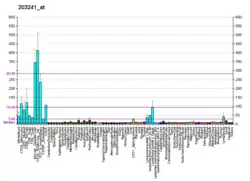UVRAG
UV radiation resistance-associated gene protein is a protein that in humans is encoded by the UVRAG gene.[5][6]
This gene complements the ultraviolet sensitivity of xeroderma pigmentosum group C cells and encodes a protein with a C2 domain. The protein activates the Beclin1-PI(3)KC3 complex, promoting autophagy and suppressing the proliferation and tumorigenicity of human colon cancer cells.
Chromosomal aberrations involving this gene are associated with left-right axis malformation and mutations in this gene have been associated with colon cancer.[6]
References
- GRCh38: Ensembl release 89: ENSG00000198382 - Ensembl, May 2017
- GRCm38: Ensembl release 89: ENSMUSG00000035354 - Ensembl, May 2017
- "Human PubMed Reference:". National Center for Biotechnology Information, U.S. National Library of Medicine.
- "Mouse PubMed Reference:". National Center for Biotechnology Information, U.S. National Library of Medicine.
- Perelman B, Dafni N, Naiman T, Eli D, Yaakov M, Feng TL, Sinha S, Weber G, Khodaei S, Sancar A, Dotan I, Canaani D (Jul 1997). "Molecular cloning of a novel human gene encoding a 63-kDa protein and its sublocalization within the 11q13 locus". Genomics. 41 (3): 397–405. doi:10.1006/geno.1997.4623. PMID 9169138.
- "Entrez Gene: UVRAG UV radiation resistance associated gene".
Further reading
- Liang C, Feng P, Ku B, et al. (2007). "UVRAG: a new player in autophagy and tumor cell growth". Autophagy. 3 (1): 69–71. doi:10.4161/auto.3437. PMID 17106237.
- Teitz T, Penner M, Eli D, et al. (1990). "Isolation by polymerase chain reaction of a cDNA whose product partially complements the ultraviolet sensitivity of xeroderma pigmentosum group C cells". Gene. 87 (2): 295–298. doi:10.1016/0378-1119(90)90316-J. PMID 2332174.
- Maruyama K, Sugano S (1994). "Oligo-capping: a simple method to replace the cap structure of eukaryotic mRNAs with oligoribonucleotides". Gene. 138 (1–2): 171–174. doi:10.1016/0378-1119(94)90802-8. PMID 8125298.
- Suzuki Y, Yoshitomo-Nakagawa K, Maruyama K, et al. (1997). "Construction and characterization of a full length-enriched and a 5'-end-enriched cDNA library". Gene. 200 (1–2): 149–156. doi:10.1016/S0378-1119(97)00411-3. PMID 9373149.
- Bekri S, Adélaïde J, Merscher S, et al. (1998). "Detailed map of a region commonly amplified at 11q13→q14 in human breast carcinoma". Cytogenet. Cell Genet. 79 (1–2): 125–131. doi:10.1159/000134699. PMID 9533029.
- Iida A, Emi M, Matsuoka R, et al. (2000). "Identification of a gene disrupted by inv(11)(q13.5;q25) in a patient with left-right axis malformation". Hum. Genet. 106 (3): 277–287. doi:10.1007/s004390051038. PMID 10798355.
- Strausberg RL, Feingold EA, Grouse LH, et al. (2003). "Generation and initial analysis of more than 15,000 full-length human and mouse cDNA sequences". Proc. Natl. Acad. Sci. U.S.A. 99 (26): 16899–16903. Bibcode:2002PNAS...9916899M. doi:10.1073/pnas.242603899. PMC 139241. PMID 12477932.
- Goi T, Kawasaki M, Yamazaki T, et al. (2004). "Ascending colon cancer with hepatic metastasis and cholecystolithiasis in a patient with situs inversus totalis without any expression of UVRAG mRNA: report of a case". Surg. Today. 33 (9): 702–706. doi:10.1007/s00595-002-2567-y. PMID 12928850. S2CID 29935419.
- Ota T, Suzuki Y, Nishikawa T, et al. (2004). "Complete sequencing and characterization of 21,243 full-length human cDNAs". Nat. Genet. 36 (1): 40–45. doi:10.1038/ng1285. PMID 14702039.
- Ionov Y, Nowak N, Perucho M, et al. (2004). "Manipulation of nonsense mediated decay identifies gene mutations in colon cancer Cells with microsatellite instability". Oncogene. 23 (3): 639–645. doi:10.1038/sj.onc.1207178. PMID 14737099.
- Kimura K, Wakamatsu A, Suzuki Y, et al. (2006). "Diversification of transcriptional modulation: large-scale identification and characterization of putative alternative promoters of human genes". Genome Res. 16 (1): 55–65. doi:10.1101/gr.4039406. PMC 1356129. PMID 16344560.
- Liang C, Feng P, Ku B, et al. (2006). "Autophagic and tumour suppressor activity of a novel Beclin1-binding protein UVRAG". Nat. Cell Biol. 8 (7): 688–698. doi:10.1038/ncb1426. PMID 16799551. S2CID 19739498.
This article is issued from Wikipedia. The text is licensed under Creative Commons - Attribution - Sharealike. Additional terms may apply for the media files.




